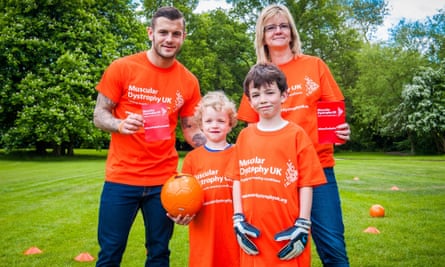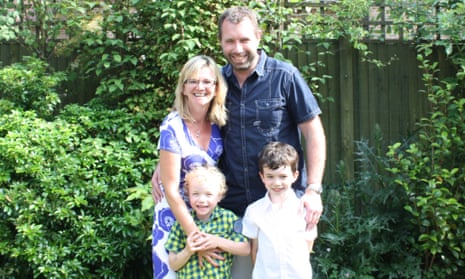In the photograph that has pride of place in the living room of Sue Barnley’s home, her son Harry is standing, all blond curls and cheeky grin, dressed as Woody from Toy Story. His brother Jack, two years older, is beside him, channelling Buzz Lightyear. For Sue, 45, the four-year-old picture belongs to that innocent time before Harry, now nearly seven, was diagnosed with Duchenne muscular dystrophy, a rare muscle-wasting disease that mostly affects boys. Now she and her husband, Tom, 39, live with the knowledge that Harry will be in a wheelchair before he is 12 and will probably die in his 20s.
“When we finally got the diagnosis in July 2013, it was hideous,” says Sue, a former sales manager from Farnham, Surrey. “We were in grief for the life Harry would not have and the hard path he would take. The doctors told us, ‘Duchenne is 100% fatal so you need to go away and enjoy your little boy and give him a good life.’ We were told not to pin any hopes on research.”
Just as they had refused to listen to experts who insisted for more than two years that Harry was a “healthy boy” despite his odd gait and poor stamina, the Barnleys haven’t heeded medical advice on research either. In less than two years, they and their family and friends have skydived, marathoned, tray-baked and dinner-danced their way to £130,000 for Duchenne research through their help4harry campaign. They are Muscular Dystrophy UK’s top family fundraisers.
Sue and Tom are in the vanguard of the increasingly bitter battle to persuade NHS England to fund Translarna, the first drug to target the genetic cause of MD. Translarna is only suitable for a minority of “Duchenne boys”, whose disease is caused by what is known as a “nonsense mutation”. Harry Barnley is one of only 50 of the 2,500 people in the UK with Duchenne suitable for a drug treatment that might give him three more years on his feet.
Patients can be prescribed the drug, developed by an American pharmaceutical company, PTC Therapeutics, only if they are still mobile. And although Harry is still walking, Sue knows that the rate of his decline is unpredictable. Imagine how the Barnleys felt last month when NHS England effectively deferred a decision on funding the new drug – it costs around £180,000 per child per year – until next year. Approved by the European Medicines Agency last summer under a conditional licence that allows patients early access to medicines for life-threatening diseases, Translarna is already being prescribed in France, Germany and Spain.
Sue says she knows another British candidate for Translarna, slightly older than Harry, who could still climb stairs a few months ago but now can’t. Some boys who are suitable for the drug will be using wheelchairs before the deferred decision is made.
“It is so frustrating,” says Sue. “For the first time there is an effective drug and yet we have to watch our sons deteriorate while they argue over funding. NHS England put the families through the hell of waiting. Those last two days were terrible – and then not to get a decision …” She trails off.

Nic Bungay, campaigns director for MD UK, says Translarna has been caught up in a bureaucratic mess following the reorganisation of health services. The body that used to decide on funding for expensive new medicines for rare conditions – known as “orphan drugs” – disappeared in the restructuring and there has since been confusion over procedures.
Charities, campaign groups and sympathetic MPs have been pushing for interim funding for Translarna and also for new drug treatments for the rare conditions Morquio Disease and Tuberous Sclerosis. A few days after the Translarna decision was deferred, the Commons Speaker, John Bercow, and the Lib Dem MP Greg Mulholland were involved in a clash in the Commons when Mulholland tried to highlight the agony of the waiting families. Bercow judged him to be taking too long to ask a question and Mulholland walked out of the chamber. Duchenne families felt their plight was lost in the row and were furious at Bercow. “It just added to the whole fiasco,” says Sue bitterly.
Campaigners are now pushing for the deferred decision on Translarna to be made before the end of this year. Sue thinks NHS England was deaf to that clock that is always ticking for Duchenne families when it decided to refer the decision on Translarna to the National Institute for Health and Care Excellence (Nice).
Harry is becoming less mobile. He did not want to take part in his school sports day a few weeks ago. “He said, ‘I’ll just come last because of these’ and pointed to his legs,” says Sue. His legs are increasingly painful and he wears night splints.
Sue and Tom are reluctant activists because fighting costs them precious time with Harry and Jack and has forced their children into too much contact with the “World of Duchenne” – a world with which, they, as adults, still struggle. “I could not have coped with a Duchenne conference in the first year,” says Sue. “There are a lot of older boys in wheelchairs and some can’t feed themselves.”
Earlier this year, Harry was one of a handful of Duchenne boys who delivered letters to David Cameron explaining what Translarna could mean for them. “Afterwards, Harry asked if he would one day be in a chair like the other boys and, actually, he was a bit excited about it,” says Sue sadly.
Jack is ahead of his brother on the learning curve but neither boy yet knows the disease is fatal.
“Weeks after the visit to Downing Street, I was doing a jigsaw with the boys,” says Sue. “Harry suddenly said that Jack had told him he wouldn’t be able to get out of his wheelchair once he was in it. Harry said, ‘That’s not right is it – my legs will still work?’”
Sue told Harry as gently as she could that he would be able to get out of the wheelchair at first, but eventually wouldn’t be able to use his legs. “You can’t not tell them the truth,” she says simply. The information seemed to hit home, but a week later Harry said that when he grows up he wants to be a fireman.
Sue spreads the blame for Harry’s predicament widely – the current confusion around “orphan” drug funding, “odd” NHS priorities, poor funding of the health service, and drug companies making too much profit. She also argues that the government is too paternalistic and that families with children suffering from fatal rare conditions ought to be allowed to take risks with new drugs.
“When Harry wrote his letter to David Cameron, we got 8,000 views on our website,” says Sue. “But, in the end, I was just cross that my six-year-old had to write to the prime minister, begging for a drug.”
Muscular Dystrophy UK’s helpline number is 0800 652 6352 (freephone) or visit musculardystrophyuk.org for more information

Comments (…)
Sign in or create your Guardian account to join the discussion